“Looters become looted, while time and tide make us mercenaries all.”
—Patrick Rothfuss, The Wise Man’s Fear
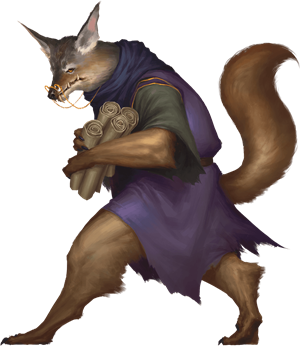 The Blood War consumes the Lower Planes. It exists in the back of every fiend’s mind—save for those so tormented that rational thought is beyond them, such as manes and lemures. So far, this series has given advice on how to play the creatures serving on either side of the Blood War: devils fighting for tyrannical order and the stability of the Nine Hells, and demons fighting for utter chaos and the endless hunger of the Abyss. There are fiends that exist outside of this dichotomy of law versus chaos. Some of these neutral fiends defy classification, such as succubi and incubi, hell hounds , and nightmares. These fiends often have some sort of loose allegiance (such as incubi to the Demon Lord Graz’zt and nightmares to their devilish narzugon riders, but there are fiends that exist outside of the hierarchies of demons and devils entirely.
The Blood War consumes the Lower Planes. It exists in the back of every fiend’s mind—save for those so tormented that rational thought is beyond them, such as manes and lemures. So far, this series has given advice on how to play the creatures serving on either side of the Blood War: devils fighting for tyrannical order and the stability of the Nine Hells, and demons fighting for utter chaos and the endless hunger of the Abyss. There are fiends that exist outside of this dichotomy of law versus chaos. Some of these neutral fiends defy classification, such as succubi and incubi, hell hounds , and nightmares. These fiends often have some sort of loose allegiance (such as incubi to the Demon Lord Graz’zt and nightmares to their devilish narzugon riders, but there are fiends that exist outside of the hierarchies of demons and devils entirely.
These fiends, called yugoloths, are denizens of the Bleak Eternity of Gehenna, a lower plane aligned to the cosmic forces of neutrality and evil. Souls that act selfishly, greedily, cruelly, or that commit purposelessly evil acts are often consigned to an afterlife in Gehenna. These souls become yugoloths. Like demons and devils, yugoloths take many forms, which reflect the powers their evil spirits have developed in their new lives. Legend says that the yugoloths were first created by a sisterhood of night hags, and that these hags were commissioned by Asmodeus to create an army of fiends that could fight eternally within the Nine Hells. The story of the yugoloths and their creation is told in greater detail in their entry in the Monster Manual.
As the yugoloth civilization grew and spread across Gehenna, it eventually began to spread across other planes, and now the planes of Gehenna, Carceri, Hades, and Acheron exist under at least partial yugoloth hegemony. As they spread across the multiverse, conquering as they went, yugoloths began to be approached by mortals and extraplanar beings alike who sought their martial talents. Over the eons, since the first contract was forged with a yugoloth warlord, these neutral evil fiends have earned a reputation as the finest mercenaries in the multiverse.
Yugoloth mercenaries are expensive beyond most mortals’ imagining, and they are self-serving to a fault. They lack both the extreme unpredictability of demonic hordes and the strict orderliness of diabolical legions. In a phrase, yugoloths are selfishness embodied.
Summoned yugoloths demand much for their time and loyalty. Whatever promises a yugoloth makes are quickly broken when a better opportunity presents itself. Unlike demons, yugoloths can be reasoned with, but unlike devils, they are rarely true to their word.
—Monster Manual
Yugoloths are employed most frequently by Asmodeus and the other Lords of the Nine, whose ill-gotten wealth vastly exceeds that of any mortal nation. Also, though demons often seem like mindless beasts, many of them possess an alien cunning—and some yugoloths are brave enough to approach them in search of lucrative employment. Since yugoloths can’t be permanent killed outside of their home plane of Gehenna (they simply dissolve into ichor and reform on Gehenna when killed elsewhere), they can fight without fear of consequences in any battlefield across the multiverse. This fearlessness, combined with their unmatched martial skill, allow yugoloths to raise their mercenary rates to unimaginable heights—and for warlords across the cosmos to pay them, nonetheless.
Yugoloths in the Nine Hells
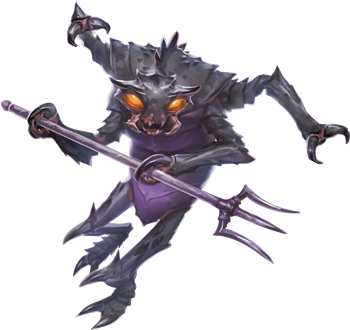 If you’re playing Baldur’s Gate: Descent into Avernus, or creating an adventure of your own that takes place in Avernus or another hot spot of the Blood War, yugoloths will help you add dimension to the battles between devils and demons.
If you’re playing Baldur’s Gate: Descent into Avernus, or creating an adventure of your own that takes place in Avernus or another hot spot of the Blood War, yugoloths will help you add dimension to the battles between devils and demons.
While exploring Avernus, any demons you meet are most likely hostile invaders, willing to kill anything that moves—except other demons. Devils could be either soldiers in Zariel’s legions, or members of her army in other ways, serving as war machine mechanics, bureaucrats, sentries, or any number of other roles. Yugoloths have only a single role in Avernus—mercenary—and a single goal: acquiring wealth. They may serve devils, demons, or even mortals, but their true loyalty is always to themselves above all others.
When a character meets a yugoloth in Avernus, the yugoloth likely thinks three things before taking action.
- Who are they? Does my contract require me to destroy them or protect them, or neither?
- Will my employer reward me if I destroy them or protect them?
- Will it benefit me to destroy them or protect them—or to create a new contract with them?
If the yugoloth’s outlook is neutral towards the characters, it likely attacks—it is a cosmic embodiment of evil, after all! However, unlike a demon which fights to the death, a yugoloth knows when it’s beaten, and flees or surrenders. A yugoloth that surrenders might even try to make a deal with the characters, offering a reduced rate in exchange for sparing it the embarrassment of being bested by mortals. If a yugoloth is hostile towards the characters, it fights to the death, unless it thinks it can get a better deal out of the characters. Yugoloths have no sense of loyalty to their employers, and if its enemies can offer a higher rate, it will jump ship in a heartbeat.
Dealing with Yugoloths
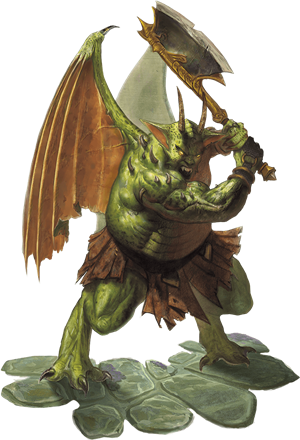 Baldur’s Gate: Descent into Avernus has a full appendix dedicated to describing how to make deals with devils. Infernal contracts are often tricky, written exclusively in Infernal, and filled with predatory clauses designed to fool you into giving up your soul. Yugoloths are much more straightforward. Some yugoloths desire souls—as a fell ritual powered by mortal souls can resurrect a yugoloth destroyed on Gehenna—but most are content to deal in gold and other material valuables.
Baldur’s Gate: Descent into Avernus has a full appendix dedicated to describing how to make deals with devils. Infernal contracts are often tricky, written exclusively in Infernal, and filled with predatory clauses designed to fool you into giving up your soul. Yugoloths are much more straightforward. Some yugoloths desire souls—as a fell ritual powered by mortal souls can resurrect a yugoloth destroyed on Gehenna—but most are content to deal in gold and other material valuables.
A rule of thumb you can use when a character wants to purchase a yugoloth’s mercenary services is to multiply the yugoloth’s challenge rating by 100. The result is the amount of gold pieces a yugoloth charges per day of service. Most yugoloths only enter into contracts if their services are needed for a tenday or more—but if a contractor needs only a single task completed, the yugoloth will bill them for a full day. When entering into a mercenary contract with a stranger, many yugoloths demand half payment up front, with the other half due upon completion of the task.
If the being that purchases the yugoloth’s services can’t pay its fee in full upon completion, the yugoloth has several means of recourse. Most times, yugoloths simply kill employers that can’t pay up. Other times, wizardly yugoloths such as an arcanaloth will use magic to turn the debtor into its thrall until it pays off its debt—at a rate of 1 gold piece per day of servitude. Though dominate person isn’t in the arcanaloth’s stat block, it’s possible that such a creature has the spell written in its spellbook, and will return to claim its revenge the next day, after preparing the spell.
Neutrality and Evil Incarnate
Depicting neutrality in a compelling way can be difficult in D&D. It’s easy to represent devils as lawful by showing their rigid, authoritarian, and bureaucratic society. It’s likewise simple to depict demons as slavering hordes of chaotic monsters. In a way, yugoloths’ society of self-interest and lax rules are much more relatable to real-world humans than either of the cosmic extremes of law or chaos. This humanizes yugoloths in a way that can make them less innately terrifying than devils or demons. When running encounters with yugoloths, you can lean into this familiarity, or try and disguise it behind smoke and mirrors.
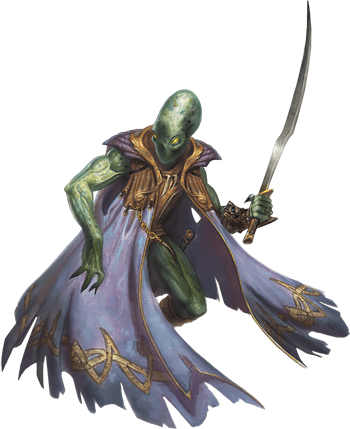 The most terrifying thing about a yugoloth is the innate evilness of their being. Countless stories like Star Wars and Lord of the Rings are predicated upon an idea that redemption is possible and that pity for a single wicked being can save the world. Such optimism has no place in an adventurer dealing with yugoloths. The only possible flicker of hope for a yugoloth aiding another is when it has something worthwhile to gain. In any other circumstance, even if the yugoloth stands to profit slightly, utter malice is the fiend’s modus operandi. If it came at the cost of causing good in the multiverse, such slight profit would be of no worth to a yugoloth.
The most terrifying thing about a yugoloth is the innate evilness of their being. Countless stories like Star Wars and Lord of the Rings are predicated upon an idea that redemption is possible and that pity for a single wicked being can save the world. Such optimism has no place in an adventurer dealing with yugoloths. The only possible flicker of hope for a yugoloth aiding another is when it has something worthwhile to gain. In any other circumstance, even if the yugoloth stands to profit slightly, utter malice is the fiend’s modus operandi. If it came at the cost of causing good in the multiverse, such slight profit would be of no worth to a yugoloth.
So, to adventurers that would hire a clever arcanaloth in order to defeat a cult of Tenebrous and save their homeland—or some other such virtuous act—must beware. Even if the money were good, the yugoloth would attempt to fulfil its contract to the letter of the law, then attempt to foil the act of goodness. The quickest way would be to immediately offer its services to the remnants of the evil faction it helped disband, spilling secrets it learned about the adventurers while in their employ. Even if a yugoloth doesn’t outright betray a virtuous employer, it’s certain to find a way to secretly twist its employer’s meaning to its own malicious ends. Of course, it would do this in such a way that it would seem unknown to its employer until after it was paid in full.
Unlike creatures like drow, orcs, and the other traditionally “evil” species in the D&D multiverse, whose evilness comes from cultures that prize selfish and cruel values rather than any internal evilness, yugoloths are avatars of the concepts of evil and neutrality. If a yugoloth were to become innately good—or even simply not evil, but true neutral—it would no longer be a yugoloth. It would cease to be a fiend and become some other sort of creature of neutrality and balance. To make a yugoloth’s cosmic nature as an evil spirit expressly clear to your players, consider incorporating these traits while in combat:
Highest Bidder. When a yugoloth recognizes that it’s fighting a losing battle (such as when half its allies are defeated, or its escape routes are blocked off, at the DM’s discretion), it offers the characters a chance to hire it instead of risking further injury in combat. Its price is equal to its challenge rating × 75 gp per day of employment, up to 10 days. This is a 25% discount over its usual rate, since it’s in dire straits. A character that makes a successful Charisma (Intimidation) check contested by its Wisdom (Insight) check reduces the price to its challenge rating × 50 gp per day.
Pragmatic Combatant. A yugoloth assesses combat situations evenly, choosing tactics that ensure its personal survival, even at the expense of its allies. Consider a yugoloth’s Intelligence score when deciding its tactics. For example, a mezzoloth with an Intelligence of 7 (–2) is pragmatic insofar as it tries to kill a single enemy as quickly as possible, without much mind for complex maneuvers. On the other hand, an ultroloth with an Intelligence of 18 (+4) stays out of the line of fire by using its Teleport or Hypnotic Gaze actions whenever enemies get too close, and using spells like wall of fire to keep its foes at bay.
How have you played yugoloths in your game? Do you have any stories of truly terrifying encounter with these fiends?
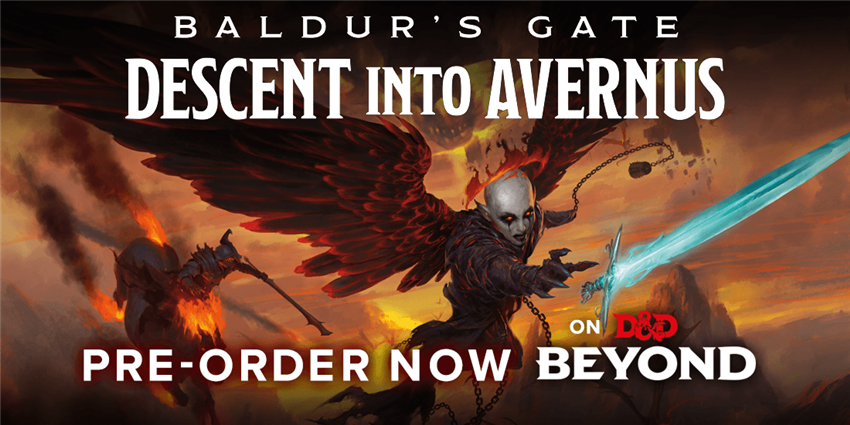
You can pit your characters against the forces of the Abyss and the Nine Hells in Baldur’s Gate: Descent into Avernus, now on the D&D Beyond Marketplace!
 James Haeck is the lead writer for D&D Beyond, the co-author of Waterdeep: Dragon Heist and the Critical Role Tal'Dorei Campaign Setting, a member of the Guild Adepts, and a freelance writer for Wizards of the Coast, the D&D Adventurers League, and other RPG companies. He lives in Seattle, Washington with his partner Hannah and their animal companions Mei and Marzipan. You can find him wasting time on Twitter at @jamesjhaeck.
James Haeck is the lead writer for D&D Beyond, the co-author of Waterdeep: Dragon Heist and the Critical Role Tal'Dorei Campaign Setting, a member of the Guild Adepts, and a freelance writer for Wizards of the Coast, the D&D Adventurers League, and other RPG companies. He lives in Seattle, Washington with his partner Hannah and their animal companions Mei and Marzipan. You can find him wasting time on Twitter at @jamesjhaeck.








-
View User Profile
-
Send Message
Posted Sep 25, 2019There is a TOOLTIP NOT FOUND for something at the start
-
View User Profile
-
Send Message
Posted Sep 25, 2019Kings Killer Chronical quote!
Awesome article, always helpful to understand the nuances for the monsters to help make each encounter unique for these adventures!
-
View User Profile
-
Send Message
Posted Sep 25, 2019So, what would happen if a yugoloth drew the Balance card out of a Deck of Many Things?
-
View User Profile
-
Send Message
Posted Sep 25, 2019Assuming it affected the Yugoloth then according to this article it would cease to be a Yugoloth and become an entity of neutral good. Of which I couldn’t find anything under Celestials.
Does it undergo a physical transformation?
Is Gehenna no longer its native plane and it reforms elsewhere on death?
-
View User Profile
-
Send Message
Posted Sep 25, 2019I currently have an Arcanaloth named Checkers, due to all his alter-egos wearing a single checkered design clothing item, as the main villain of my campaign and they successfully outsmarted the being to learn his true name... Darr-ell. He so far has been more comedy relief in the presence of the unimaginable horrors that rise from the depths of the world's oceans but potentially using these tips might have him be far more of a terror or powerful ally than previously. Thank you.
-
View User Profile
-
Send Message
Posted Sep 25, 2019Nice job!
-
View User Profile
-
Send Message
Posted Sep 25, 2019I think that a nycaloth would turn into a nice-aloth
-
View User Profile
-
Send Message
Posted Sep 25, 2019I feel like yugoloths wouldn't care at all about their own safety unless they were in Gehenna. I doubt they'd even switch sides, since they could just reform and claim their payment later from their original employer anyway.
-
View User Profile
-
Send Message
Posted Sep 25, 2019I don't know much about the fiendish realms. Is there a form of "civilization" or commerce that would encourage these creatures to demand gold as payment? Do they spend enough time on more earthly planes to use the gold? Is it all just a fiendish characteristic of greed and taking resources that humanoids would actually find useful?
-
View User Profile
-
Send Message
Posted Sep 26, 2019Yugoloth: I'm here to kill you
Party: We'll pay you 100$ to **** off
-
View User Profile
-
Send Message
Posted Sep 26, 2019That is mostly correct.
The Monster's Manual even explicitly states: "Back to Gehenna. When a yugoloth dies, it dissolves into a pool of ichor and reforms at full strength on the Bleak Eternity of Gehenna. Only on its native plane can a yugoloth be destroyed permanently. A yugoloth knows this and acts accordingly. When summoned to other planes, a yugoloth fights without concern for its own well-being. On Gehenna, it is more apt to retreat or plead for mercy if its demise seems imminent."
However, if we want a more nuanced viewpoint, here are some additional tidbits of information.
The Monster's Manual also states "No longer indentured to anyone, the yugoloths gained independence, and they now offer their services to the highest bidder." and "Without a powerful leader to keep them in line, yugoloths fight simply to indulge their violent predilections, and only as long as it benefits them to do so." So yugoloths are definitely centered around violence and profit, but a weak argument could be made that part of the 'benefit' includes the time saved by not having to reform after death. This would be an edge case.
Lets look to sources beyond MM...
The Blood War section of Mordenkainen's Tome of Foes seems to align with the Monster's Manual:
"Regardless of the side that hires them, yugoloths almost never fight on their home plane of Gehenna despite the fact that both sides sometimes traverse it and many battles of the Blood War are fought there. A yugoloth killed in Gehenna can’t be restored to life except through an exceptional ritual, so the sums required to entice one to fight on its home plane are astronomical … and making such a bargain always draws the attention of the ultroloths." So it seems clear that yugoloths are more than willing to fight off their home plane of Gehenna with relatively little risk.
"Stygia has become a war-wracked realm. Any devils bound to either of the archdevils that aren’t needed for service in the Blood War engage in constant skirmishes across the ice, and yugoloths and other mercenaries from across the planes play a key role in the struggle." The high mortality rates involved in the Blood War, especially as they fight on both sides (the highest bidder), definitely makes you question how much yugoloths are attempting to prevent their own death. Obviously they want to be skilled and pragmatic fighters (to raise how much they can gain for their services), which does require some degree of personal survival.
The bestiary section of MToF reinforces the statements above, "Mercenaries that ply their trade throughout the Lower Planes and in other realms, yugoloths have a reputation for effectiveness that is matched only by their desire for ever more wealth. Although yugoloths aren’t especially loyal and typically try to exploit every potential loophole in a contract, they undertake any task for which they are hired, no matter how despicable." While they might not be loyal to their employer, so long as it's the most profitable situation they'll do whatever it is - which includes dying and reforming on their home plane.
Let us now look to the popular module Rise of Tiamat:
For Episode 5 it may initially seem that the yugoloth is concerned by self survival, "The yugoloths were summoned by Red Wizards and paid by the cult to kill the adventurers, but they have no loyalty to their benefactors. If a yugoloth takes damage from a single attack that deals more than half its remaining hit points, it withdraws from combat on its next turn. If it hasn’t already tried to summon another yugoloth, it does so immediately. If it’s already used that power, it simply flees, intending to regroup with other survivors later." However, this is more likely a result of pragmatic thinking than self survival - the yugoloth cannot fulfill its contract if they die.
There is, of course, an option for bribery "Because the yugoloths are mercenaries, the characters can attempt to buy them off with a better offer — one that not only exceeds what the cult is paying but covers the damage to reputation that comes from changing sides in the middle of battle. A good starting offer is 10,000 gp, or 2,000 gp per yugoloth if more than five of them are in the fight." This is a monetary focus - nowhere does it state that there's an option for mercy or an exchange for not killing them. Note, however, this is a direct contradiction to this article - the module requires a higher fee for switching in the middle of the battle, while this article implies a lower fee for switching while in dire straights (but the slightly different situations may justify this).
Looking at these sources indicate that self survival ranks very low on the list of priorities for a yugoloth (except on their home plane). If anything, self-survival more a consequence of wanting the most profitable situation. To that end, there needs to be a definite and significant monetary loss by being killed in order in order for a yugoloth to surrender and bargain for their life. It can be argued that it can damage their reputation and thus future money-making prospects, but this still seems somewhat of a stretch. A yugoloth isn't a devil - of which reputation significantly matters. Of course, it isn't a demon either - of which reputation matters very little.
This article seems to somewhat sum that up: "However, unlike a demon which fights to the death, a yugoloth knows when it’s beaten, and flees or surrenders. A yugoloth that surrenders might even try to make a deal with the characters, offering a reduced rate in exchange for sparing it the embarrassment of being bested by mortals. If a yugoloth is hostile towards the characters, it fights to the death, unless it thinks it can get a better deal out of the characters." This implies that there is a definite monetary cost due to a blow to reputation if it is killed by mortals, but it isn't necessarily afraid to die. There is also the downtime of not earning money while it's reforming in its home plane. As always - profit first!
End result? A yugoloth fights somewhat pragmatically - much like this article states! It attempts to complete the task that will yield it the most profit, and that does mean retreating when lost. However, I get what you mean, part of "Pragmatic Combatant. A yugoloth assesses combat situations evenly, choosing tactics that ensure its personal survival, even at the expense of its allies." is questionable - shouldn't the yugoloth choose tactics that ensure profit first? This often means requiring victory, so its assessment should include less focus on personal survival and more so figuring out the tactics with the highest utility possible (which can include death - although generally personal survival is the better option).
So long as it gets you to think about how a yugoloth should act, then you're doing swell! Very rarely are things black-and-white in terms of motive and actions, so the more you can get into a yugoleth head in a way that works for you, the better.
My personal conclusion? The article brings in a nice opinion to bear upon Yugoloths, but there are gray aspects of it that don't neatly align with previous source material. Use it as inspiration to create your own understanding of Yugoloths.
-
View User Profile
-
Send Message
Posted Sep 26, 2019That bit about needing "mortal souls" seems key here. They may not have any need for gold themselves beyond a desire to engage in wanton cruelty by depriving others from being able to use it, but mortals will, and they can use it to buy mortal souls (instead of engaging in the kind of trickery a devil engages in). They can convert their wealth into power in order to ensure their own positions remain secure. They're creatures of avarice, but likely also suffer from the sins of pride and envy, since they're obsessed with their own wellbeing above all else. As such, I don't think yugoloths get along well with each other, never mind the other strains of fiend.
Based on the type of creatures they are, it's likely that the planes populated by yugoloths are places where these selfish monsters constantly squabble among themselves in innumerable petty fiefdoms where every single creature is looking out for number 1 above all else and indulging in its own selfish desires without regard for others. Unlike the devils, there is no hierarchy that ultimately binds them together, because no yugoloth is willing to entertain the concept of any other being truly having any authority over it. Every underling covets its masters' position and the possessions of its peers and schemes to improve its position, and every "lord" balances atop an ever-growing house of cards as it engages in wanton cruelty against its underlings and constantly attempts to add to its collection of servants and treasures. These realms are characterized by an abundance of envious hatred and paranoia and a fundamental lack of altruism; such a notion is abhorrent to these creatures. Material wealth, as well as being a sign that "I have more than you", is also a way to maintain power: gold buys mortal servitors, spell components, and magical treasures, allowing the owner to expand their possessions even further, inflict newer tortures on every would-be schemer working against them, and (in the worst case) implement contingency plans for its resurrection via ritual if it is overcome.
-
View User Profile
-
Send Message
Posted Sep 26, 2019Great article. Made me see A lot of culture and mental similarity between Yugoloths and Drow.
-
View User Profile
-
Send Message
Posted Sep 26, 2019I think there should be some type of fallen demon/devil form, as some angels have a chance of an evil form and can fall. Maybe the demon drew from a deck of many things and got balance, this would have to have some affect other than alignment change, maybe the demon's color changes from red to white. I honestly think the demon should have a complete form change, going from fiend to celestial and it's abilities/outlook should also have a drastic change, like the demon has healing abilities and might even look completely different from before, transforming into a more fairy/animal form. The demons home plane should also change to the polar opposite of it's home plane. I have no idea how this would happen but I think it would be a very interesting addition, giving demons/devils an interesting twist of "redemption".
-
View User Profile
-
Send Message
Posted Sep 26, 2019These exist in DnD already. They are called Fallen Deva.
-
View User Profile
-
Send Message
Posted Sep 26, 2019Correct me if I'm wrong, but a Diva is a celestial, therefore it becomes more akin to a fiend when it falls. What I think Axelace was suggesting was a fiend who had "fallen" into good, becoming something akin to a celestial.
-
View User Profile
-
Send Message
Posted Sep 26, 2019If we are talking about Yugoloths, I would suggest that they would turn into some sort of animal from the Happy Hunting Grounds, as that is the polar opposite of Gehenna.
-
View User Profile
-
Send Message
Posted Sep 26, 2019It wouldn't work with a demon, but I could totally see a risen devil!
-
View User Profile
-
Send Message
Posted Sep 26, 2019When it comes to the General of Gehenna and its minions, how would you roleplay them? Especially in the case for Tomb of Annihilation and the Soulmonger.
-
View User Profile
-
Send Message
Posted Sep 27, 2019So Neutral